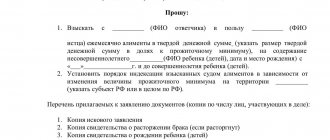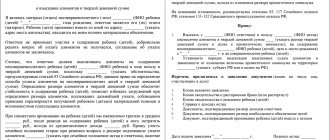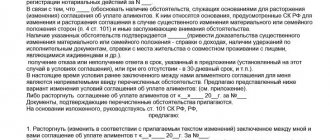Collection of alimony in a fixed sum of money is a payment procedure that is used quite often. The court often settles on this option, due to the inability of the payer to hide the real amount of his income, thus underestimating the amounts paid.
The opposite situation may also occur when the debtor receives significant income, and the interest rate turns out to be too low and does not meet the needs of the child. Today we’ll talk about how alimony is collected in a fixed amount, how its size is determined, and what is needed for the judge to make just such a decision.
General concept
To formalize the payment of alimony in a fixed amount of money, you need to collect a package of documents and apply to the magistrate’s court. Only this authority has the right to consider such cases. The size is determined based on the current subsistence level. In 2021, the minimum wage in Russia is 12,792 rubles (source). The procedure for a judge's actions is regulated by the Family Code of the Russian Federation.
Alimony in a fixed amount is assigned not only to support children under the age of majority. Such payments are provided for the maintenance of the second parent, who has taken on the responsibility of raising a child up to three years of age. To obtain alimony, you must file a claim and go to the magistrate’s court.
We also recommend using our online calculator:
| Number of common minor children: | 1 2 3 or more |
| Second parent's salary: | rub. Error |
| Deduct personal income tax from salary: | Not really |
| Other income of the second parent: | rub. Error |
The peculiarity of alimony in a fixed amount is that the amount of payment does not depend on the salary and other income of the payer. Monetary support is calculated as a multiple of the minimum subsistence level. In situations where this indicator has not been established, the judicial authorities take into account the data provided by the Russian Government.
| Amount of children | Alimony in a fixed amount | Flat alimony as a percentage of income |
| One child | At least one living wage | 1/4 (25%) |
| Two children | At least two living wages | 1/3 (33%) |
| Three children or more | At least three living wages | No more than 1/2 of income (50%), since 50% is the maximum possible amount of alimony |
The Supreme Court of the Russian Federation explained how to collect alimony
Home Press center The Supreme Court of the Russian Federation explained how to collect alimony
On December 26, 2021, the Plenum of the Supreme Court of the Russian Federation adopted a resolution on issues related to the collection of alimony. It will be useful to lawyers and family lawyers, as well as to anyone who protects their rights on their own. What clarifications are most significant for judicial practice and building a legal position on a case?
Child support
The payment by a parent of funds for the maintenance of a child on a voluntary basis in the absence of a notarized agreement on the payment of alimony is not an obstacle to the court considering a claim for the collection of alimony.
A claim to recover funds for the maintenance of a minor child may be brought to court until the child reaches the age of eighteen or until he acquires full legal capacity as a result of emancipation or marriage.
Able-bodied children over eighteen years of age who are studying full-time in basic educational programs in organizations engaged in educational activities are not classified as disabled needy persons entitled to alimony.
The requirement to collect alimony for a minor child is subject to satisfaction by the court, regardless of the parents’ ability to work, as well as the child’s need for alimony.
On the basis of a court order, alimony cannot be collected for minor children in a fixed amount of money, since resolving this issue involves the need to verify the presence or absence of circumstances with which the law connects the possibility of such collection.
A high level of income for a parent obligated to pay alimony does not in itself relate to the circumstances in which it is possible to collect alimony in a fixed amount rather than as a share of earnings. At the same time, if the court determines that the collection of alimony in proportion to the earnings and (or) other income of the parent significantly violates the interests of one of the parties, alimony may be collected in a fixed amount.
The fact that a parent has a permanent job and regular income cannot serve as an unconditional basis for refusing to satisfy the request to collect from such a person alimony for a minor child in a fixed sum of money or simultaneously in shares and in a fixed sum of money, if the court determines that the collection of alimony in share of the parent’s earnings and (or) other income does not allow the child to maintain the same level of support for him, and the collection of alimony in a fixed sum of money or both in shares and in a fixed sum of money will be most in the interests of the child and not violate the rights of the specified parent (for example , in the case where the parent hides his actual income and has other income from which alimony could be withheld).
If the debtor pays child support by court decision in a fixed amount, the court may satisfy the requirement to collect alimony for another child of the debtor in proportion to his earnings (or) other income, if there are no grounds for determining the amount of alimony for this child in a fixed amount of money. In this case, the amount of alimony for the specified child is determined by the court, taking into account the children for whom alimony in a fixed amount was also collected.
The court has the right to satisfy the request for the collection of alimony for the past period within a three-year period from the date of application to the court, if during the trial it is established that before applying to the court, measures were taken to obtain alimony, but they were not received due to the evasion of the person obliged to pay alimony, from paying them. The adoption of such measures may be evidenced, in particular, by the plaintiff’s appeal to the defendant (for example, sending telegrams, registered letters with notification or email messages) with a demand for payment of alimony or with a proposal to conclude an agreement on the payment of alimony, an appeal to the magistrate with a statement on issuing a court order to collect alimony for a minor child (if the court order was subsequently cancelled).
If a claim for alimony is filed simultaneously with a claim for establishing paternity or maternity, if the claim for establishing paternity or maternity is satisfied, alimony is awarded from the date the claim is filed. The possibility of forced collection of funds for the maintenance of a child for the past time in this case is excluded, since before the claim to establish paternity or maternity was satisfied, the defendant was not recognized in the prescribed manner as the father (mother) of the child.
The collection of alimony for minor children before the court makes a decision on the case is allowed at any time after the court has accepted an application for the collection of alimony, if there are grounds to believe that the defendant is not fulfilling the obligation to support the children.
If, during the execution of a court order or court decision to collect alimony, the child for whom it was awarded went to be raised and supported by the parent paying alimony for him, and the claimant did not refuse to receive it, exemption from payment of alimony, as well as from arrears alimony is not carried out by way of execution of the decision, but by filing a corresponding claim by this parent, since by virtue of the law, issues of collecting alimony and exemption from its payment in the event of a dispute are resolved by the court in the manner of claim proceedings. If the claimant refuses in these cases from further collection of alimony or alimony debt, the enforcement proceedings are subject to termination by the court.
Child support for adults
A claim for the recovery of alimony from a spouse (former spouse) in favor of another spouse (former spouse) may be satisfied by the court if the recovery of alimony from the defendant does not lead to the impossibility of satisfying the vital needs of this person and members of his family, whom he is legally obliged to support, for account of funds remaining after payment of alimony.
Disabled parents in need of assistance have the right to demand maintenance from their able-bodied adult children. When considering the said claim, the court finds out whether these parents have other able-bodied adult children, which of them provides them with assistance and in what form and amount, and, depending on what is established, can determine the amount of alimony, including taking into account the above circumstances, regardless of a demand was made by the parents against all children, one of them or several of them. If the court finds that the plaintiffs are deprived of parental rights in relation to the defendant, the court refuses to satisfy the request for alimony.
Disabled adults entitled to alimony should be understood as persons recognized in the prescribed manner as disabled persons of group I, II or III, as well as persons who have reached the generally established retirement age.
When resolving the question of whether a person applying for alimony is in need of help, if the law connects the possibility of collecting alimony with the presence of this circumstance, it is necessary to find out whether the financial situation of this person is sufficient to satisfy his life needs, taking into account his age and state of health and other circumstances (purchase of necessary food, clothing, medicines, payment for housing and utilities, etc.).
In particular, the plaintiff’s abuse of alcohol and (or) alcohol-containing products, his use of narcotic drugs or psychotropic substances without a doctor’s prescription, or potentially dangerous psychoactive substances or intoxicants may be considered as unworthy behavior that may serve as a basis for refusal to collect alimony for an adult capable person. substances, gambling, other behavior contrary to the interests of the family. When considering cases of this category, it is necessary to take into account when an intentional crime was committed or there were facts of inappropriate behavior in the family, the nature, severity and consequences of their commission, as well as the further behavior of the plaintiff.
Agreement on payment of alimony
If there is a notarized written agreement on the payment of alimony between the person obligated to pay alimony and the recipient, the claim for the collection of alimony may be considered by the court if, simultaneously with the said requirement, a demand for termination of the agreement on the payment of alimony is filed. In this case, the plaintiff must provide evidence confirming that he has taken measures to resolve this issue with the defendant out of court, or make a request to invalidate the agreement on payment of alimony.
When resolving disputes about the amendment, termination of an agreement on the payment of alimony or on the recognition of such an agreement as invalid, it is necessary to take into account that the rules of the Civil Code of the Russian Federation governing the conclusion, execution, termination and invalidation of an agreement on the payment of alimony are applied to the conclusion, execution, termination and invalidation of an agreement on the payment of alimony civil transactions.
A change in the financial or marital status of the parties may be recognized by the court as significant and form the basis for satisfying the requirement to change or terminate an agreement on the payment of alimony, if the financial or marital status of the parties has changed so much that if such a situation had existed at the time of conclusion of the agreement , it would not have been concluded in connection with a violation of the interests of any of the parties to the agreement, or the parties entered into it on significantly different terms.
Exemption from payment of alimony and reduction of its amount
The amount of alimony collected as a share of earnings may be reduced taking into account circumstances worthy of attention. Such circumstances, in particular, include: the presence of other minor and (or) disabled adult children with the alimony payer, as well as other persons whom he is obliged by law to support; low income of the alimony payer; the health status of the alimony payer (for example, disability due to age or health condition), as well as the child for whose maintenance alimony is being collected (for example, the child has a serious illness that requires long-term treatment).
When resolving the request of a parent paying alimony for a minor child to reduce the amount of alimony, it should be borne in mind that a change in the financial or marital status of this parent is not an absolute basis for satisfying his claim, since it is necessary to establish that such changes do not allow him to maintain the payment of alimony in the same size.
If there is evidence indicating a deterioration in the plaintiff’s financial situation (for example, a decrease in his earnings or other income) and (or) a change in his marital status (for example, an increase in the number of persons to whom he is legally obliged to provide maintenance), the court has the right to decide on satisfaction of his claim for release in whole or in part from payment of arrears of alimony, if it is established that the failure to pay alimony occurred for good reasons (for example, in connection with the illness of this person, his completion of military service, due to force majeure circumstances), and changes in the plaintiff’s financial and (or) marital status led to the impossibility of repaying the resulting alimony debt.
Responsibility for non-payment of alimony
The liability of a person obligated to pay alimony by court decision for late payment of alimony (payment of penalties, compensation for losses) occurs in the event of debt formation due to the fault of the alimony payer. Taking into account the fact that the obligation to pay alimony is monthly, the penalty for non-payment of alimony, provided for in paragraph 2 of Article 115 of the RF IC, must be determined for each overdue monthly payment based on the amount of this payment and the number of days of delay, determined on the day of the court decision for the collection of penalties.
The court may, at the request of a party to the dispute, apply a statute of limitations and refuse to satisfy the claim (in whole or in part) for the collection of a penalty on the grounds of missing the limitation period, calculated separately for each overdue monthly payment.
When filing a claim for recovery of a penalty for late payment of alimony for minor children, the plaintiff is exempt from paying the state fee.
If you need the help of a lawyer in criminal, family, or civil law, you can call 8-910-188-73-21 or write by email or telegram.
8-910-188-73-21 all methods of communication
Conditions for calculating payments in hard form
The court, having considered the case of collecting alimony from the defendant, can order payments in a fixed amount only if several conditions are met. The main thing is the absence of a notarized agreement between the former spouses on the provision of monetary assistance in favor of the child. In addition to this condition, it is necessary that the person to whom the penalty applies meets one of the following parameters:
- the citizen has a changing or inconsistent salary;
- the person is paid for work in foreign currency or given income in kind;
- The defendant has no regular income.
In addition to the noted criteria, there is one more. This is a situation where the alimony provider’s share of payments to wages does not suit the plaintiff due to violations of the interests of a minor child.
Any of these factors is a reason to go to court to assign alimony in a fixed amount. If the current situation does not fall under the noted positions, then payments are assigned as a share of the salary.
The parent who has custody of an adult child has the right to recover child support from the defendant. If a person is over 18 years old, recognized as disabled, does not work and needs specialized care, then performing such an operation will not be difficult. Please note that such information must be officially confirmed.
Also, fixed alimony can be assigned to a former pregnant wife or a woman who is raising a child under three years of age. Another option for assigning alimony in a fixed form is if the former spouse is recognized as in need of maintenance.
When is alimony awarded in a fixed amount?
Most often, alimony in a fixed amount is established by voluntary agreement, which is concluded between spouses in the presence of a notary. Although in some cases this may happen forcibly.
Alimony in a fixed amount is assigned by court only in the following cases:
- If the defendant does not have a regular income;
- If the salary or part thereof is received in the currency of a foreign country or in products;
- If the defendant is officially unemployed;
- If the financial situation in the family where the child lives has worsened, payments are assigned as a percentage of the second parent’s salary.
Amount of cash payments
Article 83 and Article 117 of the Family Code of the Russian Federation indicate the amount of alimony in a fixed amount. Some regions of Russia independently set this value. If there is no specific indicator on the territory of the subject, then the data accepted by the Government of the country are used.
Video
The court hearing a child support case must maintain a comfortable level of financial support for the minor. The judge must take into account the financial and marital status of both parties (claimor and defendant), listen to their arguments, and study the submitted documents on income. Only after this does he determine the amount of monthly monetary support.
When applying to the court, the plaintiff is obliged to provide a calculation of alimony. Moreover, the value of financial assistance must be justified and proven. Documents that confirm information about the defendant’s income help to complete this procedure.
One more nuance. A parent who does not want to pay large amounts of alimony should strive to provide the court with income certificates, which indicate the minimum possible amount of official earnings. If the unscrupulous alimony provider is an individual entrepreneur, then he prepares documents that reflect an insignificant profit from commercial activities or a loss. It is clear that the alimony collector is not satisfied with this situation. To achieve a fair court decision, it is necessary to present reasonable arguments proving that the payer has income that he is trying to hide.
The court orders payments depending on the documents provided. For the court, the official and unofficial income of the alimony worker is important. If everything is clear with the first group, then the hidden profit must be proven. In addition, when assigning financial assistance, the judge also takes into account the marital status of the payer. A new family also requires maintenance. Therefore, the plaintiff cannot count on monetary support that exceeds the indicators specified in Article 81 of the RF IC.
Advantages
The key advantage of alimony in a fixed form is the ability to recover from the payer funds that exceed the standard percentage of the salary (one of the provisions of the Family Code). The most important rule here is the presence of evidence of the real size of the monthly profit of the alimony provider.
Useful video: the amount of alimony in a fixed amount
Video
Flaws
Alimony in a fixed amount is not without its disadvantages. The main difficulty is the complexity and complexity of the process, as a result of which the court sets a fixed amount of monetary payment. In addition, the claim proceedings take quite a long time. If the plaintiff is ready to endure all the difficulties and temporary losses, then this option can be used.
How to determine their size for two children?
In this section, we will share the principles by which you can calculate the amount of alimony payments in a fixed form. In general, fixed alimony cannot be lower than the percentage of collection introduced by Article 81 of the Family Code.
Changes in alimony benefits are considered by the court on an individual basis on a separate claim (IC Article 81, paragraph 2, 119).
On the other hand, fixed payments are based on the children's subsistence level established by the Government for the region of permanent residence of children.
An example of calculating alimony in a fixed amount. The father is not officially employed. His mother has information that his unofficial monthly income is more than 60 thousand rubles. 60,000/3 = 20,000, or 10 thousand for each child, which is only slightly higher than the all-Russian PM indicator for children (PP No. 352 03/30/2017).
The mother may request this amount when filing a claim if:
- will be able to prove the father's income.
- The father is not burdened with other child support obligations.
- It doesn't work for objective reasons.
- Will be able to prove that this amount is required for the maintenance of children.
If the mother works, then the amount of alimony will be set taking into account her earnings (SK Art. 61). When assigning child benefits, the court takes into account the life situation, actual financial situation and health status of both parties.
Design rules
To obtain alimony in fixed monetary terms, it is necessary to collect and provide a certain set of documents. The documentation, together with the statement of claim, which is drawn up in accordance with the current rules, should be transferred to the magistrate's court. To open a business you will need:
- a copy of the child’s passport and birth certificate;
- a certificate confirming the defendant’s place of residence;
- marriage certificate and document on dissolution of the union (copies);
- calculation of the amount of alimony claimed by the plaintiff;
- justification of expenses for the maintenance of a minor.
Only the plaintiff determines where the judge will hear the case (at the place of residence of the alimony collector or at the place of residence of the defendant). When drawing up a statement of claim, you must provide this information. The claim must contain information, supported by documents, about the defendant’s sources of income.
statement of claim for the recovery of alimony in a fixed amount:
The procedure for collecting alimony
In order to receive alimony in a certain amount established by the court, you must write a corresponding application to the court.
When considering this application, the judge will take into account:
- The amount requested by the plaintiff and the justification for this amount;
- The defendant’s income (including unofficial, but if it is confirmed by testimony);
- Marital status of the plaintiff and defendant.
It is in the interests of the plaintiff to provide information about the defendant’s income and support it with evidence.
Arbitrage practice
Judicial practice of collecting alimony in a fixed amount shows that in 2021 the following are entitled to receive such payments:
- Minor children.
- Disabled adults.
- A parent raising a disabled child.
- Pregnant woman.
- The spouse who is involved in raising and maintaining the child.
- A parent who became incapacitated and disabled within 1 year of the divorce.
Recently, the number of such court cases has increased, as in 2021 the number of unemployed people and people hiding their real income has increased.
Video
Conclusion
Having completed the consideration of the case, the judge determines the amount of the penalty, which is indicated in the relevant resolution. Only this document is the basis for issuing a writ of execution - a document that is subsequently transferred to the bailiff service. Based on it, specialists organize the process of collecting alimony from the payer.
Receiving alimony in a fixed form is beneficial for those parents in whose care there are children under the age of majority, who understand that the payer is covering their real monthly income. If he can be obliged to transfer a specific amount of money, then it is better to choose this option when going to court. Moreover, the size can subsequently be adjusted upward or downward.
Obviously, this option is not suitable for all recipients of alimony payments. Before going to court, you should weigh and analyze everything. If possible, it is better to seek advice from an experienced specialist who practices family law. In this case, errors are excluded. The plaintiff must understand that the well-being of the joint child depends on alimony and its timely receipt.
What amount of fixed alimony payments should be indicated in the claim?
Note that the amount of fixed payments should be tied to the cost of living . In the claim, you can indicate any amount, linking it with the named value. Relatively speaking:
- 9000 rubles, that is, 1 living wage;
- 4500 rubles – 0.5 subsistence minimum;
- 13,500 rubles – 1.5 subsistence minimum.
Attention: all figures are given as an example; the minimum living wage changes once a quarter and is set both for the country as a whole and for individual regions.
How much to ask? It is quite difficult to answer this question unequivocally. Some lawyers give this advice: ask for more - and then the court will cut it at its discretion. Others recall the popular wisdom: if you want a lot, you will get little. Probably the correct answer is the golden mean. You need to ask for the maximum, but taking into account the financial capabilities of the defendant.









